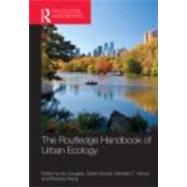- ISBN: 9780415498135 | 0415498139
- Cover: Hardcover
- Copyright: 2/22/2011
The birds, animals, insects, trees and plants encountered by the majority of the world's people are those that survive in, adapt to, or are introduced to, urban areas. Some of these organisms give great pleasure; others invade, colonise and occupy neglected and hidden areas such as derelict land and sewers. Urban ecology analyses this biodiversity and complexity and provides the science to guide policy and management to make cities more attractive, more enjoyable, and better for our own health and that of the planet. This book provides a state-of the art guide to the science, practice and value of urban ecology to help everyone understand and enjoy their urban habitat.Original contributions from leading academics and practitioners from across the world provide an in-depth coverage of the main elements of practical urban ecology. The sixty five chapters provide practitioners and students with the wealth of interdisciplinary information needed to manage the biota and green landscapes in urban areas. In six parts it deals with the philosophies, concepts and history of urban ecology; followed by consideration of the biophysical character of the urban environment and the diverse habitats found within it. It then examines human relationships with urban nature, the health, economic and environmental benefits of urban ecology before discussing the methods used in urban ecology and ways of putting the science into practice.Urban areas have high biodiversity. Urban gardens and vegetable plots have multiple benefits, from helping to reduce greenhouse gases to providing insect and bird habitats. Encounters with nature in cities help to improve our physical and mental health. The ecosystem services provided by nature in cities include cooling the urban area, reducing urban flood risks, filtering pollutants, supplying some of our food, and giving opportunities for accessible recreation. Yet protecting urban nature faces competition from other urban land uses.






